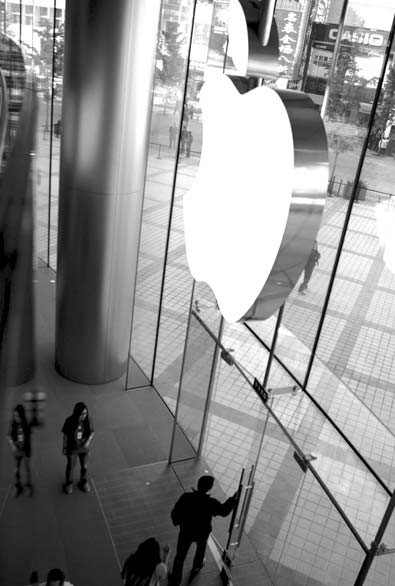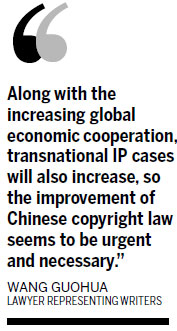|

The new Apple "experience store" on Wangfujing Street in Beijing is the largest in Asia. The high-profile high-tech company has also attracted lawsuits in China. Zhu Xingxin / China Daily
|

More than a year after eight Chinese writers jointly filed a lawsuit against Apple Inc for copyright infringement, Beijing No 2 Intermediate People's Court began hearing the case on Oct 11.
In the suit, the writers - all well-known names in China including Murong Xuecun, Li Chengpeng and He Ma - claim the electronics giant sold electronic versions of their books on its online App Store without authorization.
While fact-finding and further investigation was blamed for the delay, the writers' lawyer Wang Guohua said "Apple does not show a positive attitude towards the writers' complaint and has adopted a strategy of procrastination".
Citing business secrets, Apple requested that the case be heard in private, but the move was rejected by the court.
The company's representatives then said developers of the infringing application were the proper defendants, not Apple, and the unlicensed electronic books have been taken off the App Store site.
Wang countered that some of the books in question can still be found at the online store and are heavily downloaded, continuing to damage the sale of authorized books and causing economic losses to the authors.
The eight writers are asking for 10 million yuan ($1.6 million) in a total compensation for copyright violations on 34 books, according to court documents
"The compensation is calculated according to the writers' average remuneration of 1 yuan per word," said their lawyer. "Actually, most of them can sell their works at 3 to 4 yuan for each word to publishing houses."
"If the case occurred in countries such as the US or Britain, much higher compensation might be demanded by writers," Wang said.
Courts in China usually decide the amount of compensation using a copyright royalty formula by the National Copyright Administration first adopted in the 1990s, which is much lower than current market prices, Wang said.
"Along with the increasing global economic cooperation, transnational IP cases will also increase, so the improvement of Chinese copyright law seems to be urgent and necessary," he added.
Chinese officials are already moving to double potential compensation. In March, the NCA announced on its official website that the revised draft of the Copyright Law now under review and public comment would set the limit for compensation in a copyright case at 1 million yuan, twice the current amount.
haonan@chinadaily.com.cn
(China Daily 10/24/2012 page17)


